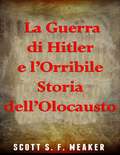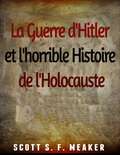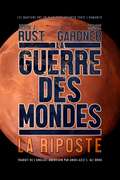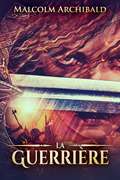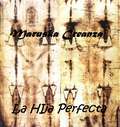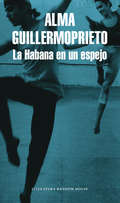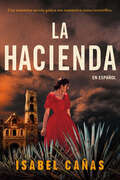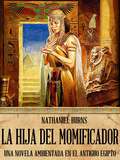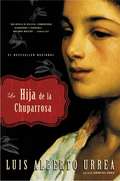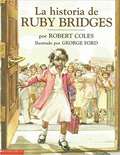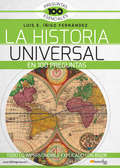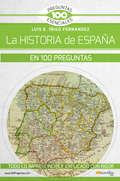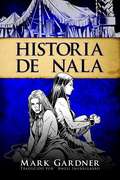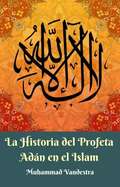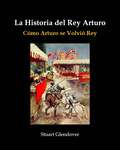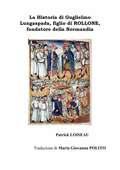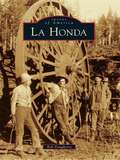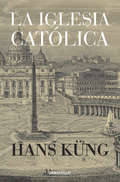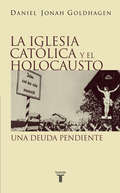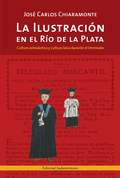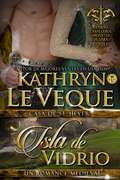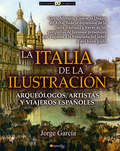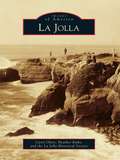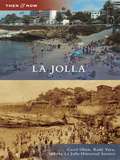- Table View
- List View
La Guerra di Hitler e l’Orribile Storia dell’Olocausto
by Scott S. F. Meaker Fabiana LombardoUn antico detto sostiene che la storia è scritta dai vincitori. Sulla base di questa affermazione, diventa una sfida scrivere di Hitler e della Seconda Guerra Mondiale senza farsi influenzare dai pregiudizi. Il termine Olocausto deriva dal greco hòlos che significa "completo" e kaustòs che vuol dire "rogo". L'Olocausto rimane un riferimento dello sterminio di sei milioni di ebrei durante la Seconda Guerra Mondiale. Questo libro rappresenta un tentativo per osservare meglio che tipo di contesto abbia permesso ad un paese civilizzato di mettere in atto l'Olocausto. E' qui che inizia una sfida per raccontare questa storia senza apparire critico nei confronti di una società civilizzata che riteneva normale ammassare e sterminare intere società di persone.
La Guerre d'Hitler et l'horrible Histoire de l'Holocauste
by Hanène Baatout Scott S. F. MeakerNote : La guerre d'Hitler et l'horrible Histoire de l'Holocauste est un résumé. Attention: Contient un contenu très violent. Ce livre est recommandé pour l'âge 18+ L'Holocauste reste comme une référence à la destruction d'environ six millions de Juifs. La collection des undesirables a commencé en 1933 avec la construction du premier camp de concentration. Comme la puissance de Hitler s'est renforcée, il a fait en sorte que d'autres types de gens soient considérés comme inutiles et gênants. Dès qu'Hitler est arrivé au pouvoir, la destruction lente des juifs a été mis en place. En 1942, environ un million de Juifs avaient déjà été tués. L'exécution était l'une des causes de la mort. Deux millions et demi ont été gazés et un demi-million sont morts de faim. L'épidémie de typhus a fait beaucoup d'autres victimes. Après la victoire des Alliés, l'Allemagne a été dans le chaos. Ce livre est un effort qui permet d'observer le type de situation qui permettrait à un pays civilisé de laisser l'Holocauste avoir lieu.
La Guerre des mondes : la riposte
by John J. Rust & Mark Gardner1898 : Les tripodes martiens semèrent la désolation dans les villes de la planète Terre. Les armées du monde furent incapables de contenir la fureur de la destruction. Alors que tout semblait perdu, une bactérie ordinaire extermina les extraterrestres. Utilisant les technologies abandonnées par les Martiens, les humains construisirent des armements de pointe. 1924 : Armées de leurs propres vaisseaux spatiaux, engins d'artillerie automotrice et avions de combat, les nations du monde sont prêtes à conduire une riposte sur la planète Mars. David Beatty, George Patton, Erwin Rommel, Charles de Gaulle, Georgi Joukov... mènent leurs troupes à travers la Planète rouge dans le but de mettre définitivement un terme à la menace martienne. Mais les Martiens possèdent une dernière et désespérée option qui en cas de réussite pourrait signifier la fin de l'humanité.
La Guerrière
by Camille Baheux Malcolm ArchibaldDécouvrez l’âge sombre de l’Écosse qui n'a jamais existé. Melcorka, fille des îles, apprend que sa terre natale, Alba, est attaquée par une horde d’envahisseurs. Délaissant une vie de luxure et de paresse, elle choisit d’emprunter la voie des guerriers et part libérer son pays du fléau nordique. Avec l’aide de ses compagnons, elle doit rejoindre le sud pour unir les clans et faire face à un ennemi redoutable.
La HIja Perfecta
by Alfonso Colmenares Maruska Creanza"La Hija Perfecta" La historia que se cuenta en la novela gira en torno al nacimiento de Megan, que se produjo a través de un experimento científico. Un experimento audaz, excepcional, profano... futurista. Megan, desde una edad temprana, descubre tener habilidades extraordinarias. Capacidades, que van a sacudir a los científicos que la crearon. Capacidades, estas que querrán ser explotadas por Aurel y su secta. Aurel, el iluminado, tiene la intención de volver a establecer un "nuevo orden mundial", pero a expensas de la libertad y la vida de todos los seres humanos en la Tierra. Las acciones audaces y temerarias de un hombre joven, desbaratan los planes de todos. Megan descubre que su vida se ha "construido" en el deber de mantenerla prisionera. Entre Megan y Alex, ahora, es inevitable que se desarrolla una mejor comprensión. A pesar de esto, en la vida de Megan, nada va a ser fácil, nada se concederá tan fácilmente. Ella es la hija perfecta, va a luchar y sufrir para encontrar su lugar en el mundo. La novela La hija perfecta es historia, es mito, mística... pero también es amor, aventura, alegría y drama. Ficción atrevida, aventura y amor... todo esto es la hija perfecta... una novela pensada para mantener al lector pegado a sus páginas... una novela fluida y suave, que implica desde la primera línea. Feliz lectura para todos ustedes. Emociones escritas.
La Habana en un espejo
by Alma GuillermoprietoInscrita en la tradición de la obra de Joan Didion, V.S. Naipaul y Ryszard Kapuscinski, La Habana en un espejo aborda un tema político y social a través de la crónica, género por el que Alma Guillermoprieto, premiada en varias ocasiones, ha pasado a formar parte de los mejores escritores que tratan de cerca la situación actual de América Latina. En La Habana en un espejo Alma Guillermoprieto reconstruye una de las épocas más difíciles de su vida; formada en las mejores escuelas de baile de Nueva York, a los veinte años viaja a La Habana para impartir clases en la Escuela Nacional de Danza. La confrontación con el régimen castrista y el idealismo del pueblo cubano sacuden la conciencia política de la narradora, todo ello en una época en la que la revolución parecía ser la única solución a muchos problemas. La Habana en un espejo es la historia de la reivindicación de esta artista y una reflexión acerca de un régimen, y el resultado es un relato cargado de pasión y de ira en el que la autora consigue desmenuzar sus recuerdos con un pulso ágil y minucioso. Reseñas:«Una de las crónicas más astutas y elocuentes de la América Latina contemporánea. [...] Guillermoprieto hace una descripción íntima y conmovedora, dura e inteligente de la vida cotidiana durante la revolución.»San Francisco Chronicle «Un placer de lectura, repleta de humanidad, astucia, curiosidad y conocimiento.»The New York Times Book Review «La Habana en un espejo está escrita con elegancia. Captura el espíritu y los ritmos de Cuba durante un período de cambio dramático y agitación política.»Tucson Citizen
La Hacienda
by Isabel CañasLa novela gótica mexicana se aúna con la mejor tradición de Rebeca en esta novela de suspense sobrenatural, ambientada en una remota hacienda durante los años de la guerra de independencia mexicana. El padre de Beatriz murió injustamente ajusticiado por alta traición y su hogar fue destruido. Cuando el atractivo Rodolfo Solórzano pide su mano, Beatriz decide ignorar los rumores que envuelven la muerte de su primera mujer y acepta sin dudarlo, convencida de que la seguridad económica y la posibilidad de alejarse de la ciudad y viajar hasta su rica hacienda en el campo, le harán olvidar la tragedia que ha vivido su familia. Pero la hacienda de San Isidro no es exactamente el refugio que había imaginado y cuando Rodolfo regresa a la capital y la deja sola en esa mansión aislada, las visiones y las voces empiezan a envolver a Beatriz, su sueño, su espacio, su vida. ¿Qué ocurrió realmente con la primera señora Solórzano? ¿Por qué la hermana de Rodolfo, Juana, se ríe de los miedos de Beatriz pero actúa de una manera tan extraña por la noche? Lo único de lo que Beatriz está segura es de que algo ocurre en la hacienda de San Isidro y que solo ella puede salvarse. La crítica ha dicho:«Un relato gótico de amor condenado y de espíritus vengativos.»The Washington Post «Cañas conoce claramente el género y el resultado es una brillante contribución a esta nueva generación de narrativa gótica poscolonial. Los lectores no deben perdérsela.»Publishers Weekly «Exuberante, hermosa, se merece absolutamente que la comparen con Rebeca. Una lectura esencial en este renacer del género gótico.»CrimeReads «Si te gusta el género gótico y te apetece una heroína con más potencia y una historia con garra, Donde termina la noche es el libro que estabas buscando.»Mystery
La Heredera
by Joan Wolf¿Cómo es ser la mujer más rica del reino? Para Emma Lambert, una viuda adinerada que se casó para salvar a su familia de la pobreza, no significa nada si no puede tener al hombre que siempre ha amado. Michael Hayden, cuarto hijo de un conde, ha resultado gravemente herido en la guerra. Cuando regresa a casa, descubre que una tragedia familiar lo ha convertido en conde, y ahora es un atractivo activo en el mercado matrimonial. ¿Emma podrá despertar su corazón o ha perdido para siempre al gran amor de su vida?
La Hija Del Momificador - Una Novela Ambientada En El Antiguo Egipto
by Nathaniel Burns Gabriela Morcillo ArellanoEgipto, 1233 a.C.El sueño de la joven Neti-Kert es seguir los pasos de su padre y convertirse en la primera mujer momificadora de Tebas. El reservado prefecto Shabaka, enviado especial del faraón cuya misión es combatir el crimen de la capital del imperio faraónico, también hace uso de las habilidades especiales de Neti-Kerty. Con sus poderes de deducción y su conocimiento de los muertos, Neti-Kerty ya ha ayudado a resolver muchos crímenes. Pero entonces ocurre algo inesperado: sus padres son cruelmente asesinados y el pequeño e idílico mundo de Neti se derrumba. Junto al prefecto Shabaka, se embarca en la búsqueda del asesino de sus padres. Tras sobrevivir a numerosas aventuras, se encuentran con una monstruosa conspiración... "La hija del momificador" nos traslada hasta una tierra llena de dioses, reyes, rituales y magia. El lector podrá contemplar un detallado retrato del Egipto faraónico con todas sus luces y sombras. El conocido autor Nathaniel Burns recrea fielmente una de las épocas más destacadas de la historia de Egipto y teje una estremecedora y ominosa trama de misterios en el Antiguo Egipto con una serie de personajes que el lector actual podrá reconocer a pesar del tiempo. Encienda un poco de incienso, siéntese junto a la luz y descorra las cortinas del pasado oscuro con esta apasionada historia de amor e intriga entre los vivos y los muertos en una de civilizaciones más fascinantes de la historia.
La Hija de la Chuparrosa
by Luis Alberto UrreaThis historical novel is based on Urrea's real great-aunt Teresita, who had healing powers and was acclaimed as a saint. Urrea has researched historical accounts and family records for years to get an accurate story.
La Historia De Ruby Bridges
by Robert Coles George FordRuby Bridges fue la primera nina negra que asistio a une escuela primaria solo para blancos. Al hacerlo, demostro la gran Valentia y capacidad de perdon que puede tener una nina de seis anos.
La Historia Universal en 100 preguntas (100 Preguntas esenciales)
by Luis E. Íñigo FernándezLa historia del género humano desde sus orígenes al presente. Descubra por qué no somos neandertales o para qué se inventó la escritura. Cómo surgió la democracia o por qué los chinos edificaron la Gran Muralla; qué hizo tan poderosas a las legiones romanas o por qué la guerra de los Cien Años duró más de cien años. El alba de la civilización; La época clásica; La antigüedad tardía; La edad de las tinieblas; Descubrimientos y reformas; La era del liberalismo; La primavera de los pueblos; El fin del antiguo orden; Quo vadis, humanitas? ¿Qué hizo tan poderosas a las legiones de Roma?; ¿Fue el Medievo en realidad la Edad de las Tinieblas?; ¿Cuáles fueron las causas de las Cruzadas?; ¿Por qué los aztecas practicaban el canibalismo?; ¿Por qué se descubrió de nuevo América en el siglo XV?; ¿A qué debió España su hegemonía en Europa?; ¿ Por qué la Revolución Industrial empezó en Inglaterra?; ¿Cuál fue el origen del movimiento obrero?; ¿Por qué perdió Alemania la Gran Guerra?; ¿Cuál fue el origen del feminismo? Rigor y amenidad reunidos en una colección de “alta divulgación”. Libros rigurosos pero de fácil lectura, que podrá disfrutar incluso cuando solo disponga de unos momentos. Un recorrido completo y seductor por los grandes temas del conocimiento humano. Un viaje maravilloso al mundo de la ciencia y la cultura.
La Historia de España en 100 preguntas (100 Preguntas esenciales)
by Íñigo Luis E. FernándezLas claves esenciales y cuestiones históricas imprescindibles para comprender la verdadera historia de los españoles: La Prehistoria, la Iberia prerromana y la Hispania romana, la protonación española medieval y el mundo árabe, el esplendor cultural y la colonización de América, el proyecto nacional liberal y republicano, la segunda República, la Guerra Civil y la transición a la democracia. ¿Estaba la España de la Antigüedad poblada por gigantes? ¿Adoraban los romanos el pescado de Cádiz? ¿Fue el reino visigodo de Toledo la primera encarnación histórica de España? ¿Fueron los reyes andalusíes mejores poetas que guerreros? ¿Querían de verdad los Reyes Católicos reconstruir la unidad de España? ¿Pudieron solo un puñado de aventureros venidos de España conquistar imperios tan poderosos como el azteca y el inca? ¿Cómo un país en decadencia fue capaz de alcanzar el esplendor cultural de la España del Siglo de Oro? ¿Con qué España soñaban los ilustrados del siglo XVIII? ¿Fue en verdad gloriosa la revolución española de 1868? ¿Cómo trató la II República de contentar, sin éxito, a los nacionalistas catalanes y vascos? ¿Tenía el franquismo problemas de identidad? ¿Qué sonido hacían los sables en la España de la Transición?
La Historia de Nala
by Angel Inurrigarro Mark GardnerNala, una esclava del a dinastía Han, y su hermana Hazina, son rescatadas de un mercader por un misterioso extraño. ¿Cuáles son las intenciones de este hombre? y ¿Que decisiones tomará Nala cuando se enfrente con la verdad?
La Historia del Profeta Adán en el Islam
by Muhammad Vandestra Sergio Catalán C.Para el Islam, Adán es reconocido por ser el primer ser humano y (Profeta) sobre la faz de la Tierra. El rol de Adán como padre de la raza humana es mirado con reverencia por los musulmanes. Ellos también se refieren a su esposa (Hawa) Eva como “madre de la humanidad”. A su vez consideran a Adán como el primer Musulmán, toda vez que el Qur’an declara que la totalidad de los Profetas predicó la misma creencia del Islam (sumisión al Único Dios). El Qur’an y la hadith hacen el mismo relato con respecto a la creación de Adán y Eva. En síntesis, ambos textos concuerdan en lo siguiente. Según el Qur’an, cuando Allah (Dios) informó a los ángeles que iba a poner un sucesor sobre la Tierra, ellos protestaron que los humanos provocarían derramamiento de sangre y daño, pero El les indicó que sabía algo que ellos no. Él formó a Adán con barro y le proporcionó aliento de vida. La hadith agrega que fue llamado Adán por el barro del cual fue creado, o la piel (adim) de la Tierra. Volviendo al Qur’an, cuando Dios pidió a los ángeles que se postraran ante Adán, ellos le obedecieron excepto Iblis (Satanás). El dijo, "Yo fui hecho de fuego, y Adán de barro. Yo soy mejor que él. No me postraré." El hadith sunita indica que mientras Adán dormía, Dios tomó una costilla de él y con ella creó a Eva (Hawa); sin embargo, aunque la creación de Adán y Eva está descrita en el Qur’an, el método exacto de creación no está especificado. El Qur´án dice que después de la creación de ambos, Dios mandó a Adán y a Eva no comer de un árbol del Jardín del Edén, pero Iblis (Lucifer) fue capaz de convencerlos de probarlo. Tras este hecho ambos se cubrieron al descubrirse desnudos. Por esta causa, Dios desterró a Adán y a Eva enviándolos a la tierra; textos Suni no-canónicos indican que los frutos se transformaron en espinas y la preñez se volvió peligrosa. Estos mismos textos también dicen que Adán y Eva fueron
La Historia del Rey Arturo: Cómo Arturo se Volvió Rey
by Stuart Glendover¿Quién habría podido imaginar que un problema conyugal podría dar lugar a la fascinante historia del Rey Arturo? Pero esto es lo que ocurrió. El rey de Britania Uther Pendragón quería casarse con la bella Igraine de Cornualles para que se convirtiera en su reina. Desgraciadamente, Igraine no estaba a favor de este matrimonio, por lo que Uther pidió ayuda a un mago llamado Merlín que resolvió el problema, y Uther e Igraine se casaron felizmente. Para recompensar a Merlín, el rey prometió que le daría su primer hijo a Merlín para que lo criara. Y así sucedió; cuando nació el hijo, Merlín cogió al bebé y lo bautizó con el nombre de Arturo. Al cabo de unos años, el rey Uther enfermó gravemente y, antes de morir, dijo que su hijo Arturo sería el heredero al trono. Ningún noble ni siquiera sabía de la existencia de un heredero, por lo que los nobles que estaban presentes con unos pocos miles de seguidores estaban listos para reclamar la corona. Con la ayuda de una Espada Mística, Arturo pudo convencer a todos los plebeyos y nobles de que estaba destinado a heredar el reino. Finalmente, fue nombrado caballero y, tras ello, coronado rey de aquellas tierras.
La Historia di Guglielmo Lungaspada, figlio di ROLLONE, fondatore della Normandia
by Patrick LoiseauQuesto documento è il frutto di una tesi di laurea in Lettere moderne, curriculum di scienze umanistiche, conseguita all’Università di Rennes 2, nel 2012, da Patrick Loiseau. Pur prendendo in prestito dalla storia, attraverso una serie di archivi storici, questo lavoro di ricerca deve ancora di più alla leggenda e alle fonti letterarie che hanno permesso di scoprire la figura del secondo duca di Normandia, vichingo e figlio del vichingo Rollone, fondatore della Normandia nel 911. In effetti, questo lavoro accademico è il primo a trattare di un personaggio poco noto e talvolta confuso con un omonimo, ma dall’importanza fondamentale. La scelta del titolo, “Historia di Guglielmo Lungaspada”, si spiega con le seguenti considerazioni: si tratta, sì, di parlare di storia, ma, mediante tale scelta, si tratterà di entrare dentro questa storia, di lasciarle per quanto possibile il suo significato medievale e dunque non essere solo l’attuale osservatore di una sequenza senza tempo. Si tratterà, inoltre, non di storia, ma di storia raccontata. In sette capitoli saranno restituiti tutti gli aspetti inerenti a questo tipo di pubblicazioni, in particolare le fonti, le differenze tra storia e testi, la parte leggendaria del personaggio, la sua dimensione umana, i misteri da svelare…
La Honda
by Bob DoughertyLess than 45 miles from San Francisco and Silicon Valley, La Honda is an isolated rural community nestled in the majestic coastal redwood forests of the Santa Cruz Mountains. Pioneers in the late 19th century were loggers and ranchers who competed against grizzly bears and mountain lions for food. Outlaws like the Younger brothers (partners with Jesse James) used La Honda's isolation to avoid justice. Gradually the community became a mountain retreat for cityweary San Franciscans, and in the 1960s, La Honda was home to One Flew Over the Cuckoo's Nest author Ken Kesey and his psychedelic Merry Pranksters. Today's La Honda is an enigma--its size and character have barely changed while the rest of the San Francisco Peninsula has exploded around it.
La Iglesia Católica
by Hans KüngEn este extraordinario libro el polémico teólogo Hans Küng narra la historia de la Iglesia católica desde sus orígenes en Palestina y Roma a partir de la figura de Jesucristo. Küng pasa revista al origen de las instituciones de la Iglesia, a los grandes cismas -entre Oriente y Occidente, entre catolicismo y protestantismo-, a la evolución y del papel del Papa, a los grandes papas reformadores y a la expansión de una iglesia global. El prestigioso teólogo explora la evolución histórica de concilios, obispos y cardenales, el entusiasmo misionero de la Iglesia, los orígenes del culto mariano y cómo las convulsiones de la Reforma y la Contrarreforma se pueden aún apreciar en la Iglesia católica de hoy día. El libro concluye con una valoración profunda de cómo la Iglesia puede afrontar los inmensos retos que le esperan en el nuevo milenio y que provienen de la ciencia, de las reivindicaciones y conquistas de los movimientos feministas, de quienes buscan una reforma a partir de las Escrituras y de la evolución de la moral sexual.
La Iglesia católica y el Holocausto: Una deuda pendiente
by Daniel Jonah GoldhagenUna brillante indagación moral sobre la Iglesia católica que expone el papel de la misma durante el Holocausto y delinea los pasos que cree que ha de seguir ahora para reparar su culpa. En este libro Goldhagen plantea dos espinosas cuestiones. La primera es que el papa Pío XII fue «un colaborador nazi», comparable a Pétain y Laval en Vichy. Muestra que la complicidad del Papa y de la Iglesia en la persecución de los judíos fue mucho más allá de lo que habíamos creído hasta ahora. Los líderes de la Iglesia sabían perfectamente que se estaban llevando a cabo asesinatos en masa. No se declararon en contra, ni prestaron ayuda. Algunos clérigos incluso participaron en los crímenes. La segunda cuestión es que la autoridad moral de la Iglesia católica, desde los primeros tiempos hasta el presente, se ha visto profundamente desacreditada por su virulento antisemitismo. Goldhagen detalla y juzga la culpabilidad de la Iglesia y su clero. Y sugiere que debería deshacer el daño causado al pueblo judío para redimirse. Si la Iglesia se considera a sí misma una institución moral y quiere tener voz ética en el discurso público de la actualidad, tiene una deuda pendiente.
La Ilustración en el Río de la Plata: Cultura eclesiástica y cultura laica durante el Virreinato
by José Carlos ChiaramonteEste libro, ya considerado un clásico en su género, analiza losproblemas referidos a la vida intelectual en el Río de la Plata duranteel período colonial. Publicada originalmente en 1989, La Ilustración en el Río de la Plata esel corolario de una serie de investigaciones emprendidas por José CarlosChiaramonte desde los inicios de su carrera como historiador. Esta obra,de referencia ineludible para la historia de las ideas en la Argentina,propone un enfoque que trasciende la polarización del debate sobre losorígenes ideológicos de la revolución de independencia entre quienesprivilegiaban la influencia directa de la ilustración francesa y los quereivindicaban el arraigo en una tradición neoescolástica puramentehispánica. Comienza por ubicar a la denominada #ilustración rioplatense#no en sintonía directa con los pensadores franceses sino en el másadecuado marco de la historia intelectual peninsular de la época, cuyosrasgos principales no estaban dados por la vieja escolástica sino porlos intentos de conciliar los dogmas de la fe con las desafiantes#novedades del siglo#, algo que ha sido sintetizado con la problemáticaexpresión #ilustración católica#. El panorama intelectual rioplatense afines del siglo XVIII resultaba, pues, más consecuente con el reformismoborbónico que con un supuesto cuestionamiento del orden colonial. Y estecuadro, a su vez, revelaba otra falencia de la vieja polémica entre#liberales# y #católicos#: una interpretación mecánica del papel causalde las ideas en la historia política que, en el fondo, ambas visionescompartían.Si hoy la mayoría de los historiadores ha dejado atrás interpretacionesteleológicas #amén de partisanas# de los antecedentes de Mayo, si ya nose resuelve el dilema en la disyuntiva entre Rousseau o Suárez, entre elenciclopedismo y la teología política de los jesuitas, ello se debe enbuena medida al aporte de esta obra cuya reedición presentamos.
La Isla de Vidrio
by Kathryn Le Veque Paula Andrea Silva FauréLa Isla de vidrio por Kathryn Le Veque Una mujer inmanejable y un atrevido caballero; ¿Pueden ellos hallar el amor? 1333 A.D. – La encantadora y educada Señora Aubrielle Grace di Witney es lo que amablemente se llama una mujer ingobernable. Su tío, el Conde de Wrexham, ha recibido la custodia de su sobrina porque su madre ya no puede manejar la belleza de testaruda cabeza. Como un cobarde, el conde abdica a sus deberes a su caballero más poderoso, Sir Kenneth St. Héver con las instrucciones de convertirle en una sumisa señora. Aubrielle y Kenneth están en descuerdo desde el inicio; Kenneth espera obediencia y Aubrielle es menos que complaciente. Cuando las batallas terminan un extraño, maravillosa comodidad se instala, Kenneth llega a descubrir que Aubrielle es una señora con un secreto. A causa de este secreto, su madre es asesinada y Kenneth se encuentra así mismo protegiendo a Aubrielle porque quiere hacerlo, no porque se le ha ordenado. Sectas misteriosas y un loco guerrero quieren a la señora muerta por diferentes razones. Pronto se convierte en una prueba de las habilidades de astucia y caballerescas de Kenneth para mantener con vida a su amada Aubrielle.
La Italia de la Ilustración (Historia Incógnita)
by Jorge García SánchezGoya, Moratín, Godoy, el Duque de Alba: Todo el esplendor de la Italia ilustrada a través de las peripecias de famosos personajes que viajaron a la búsqueda del saber y del buen gusto. Goya, Moratín, Godoy o el duque de Alba viajaron por Italia para imbuirse en su cultura: fue el Grand Tour Español del siglo XVIII. Sumérjase en el esplendor de la Italia ilustrada a través de las peripecias de aristócratas insolventes, aventureros cosmopolitas, arqueólogos ilustrados y artistas canallescos que viajaron a la búsqueda del saber y del buen gusto. Aristócratas insolventes, aventureros cosmopolitas, arqueólogos ilustrados y artistas canallescos pueblan el universo de los españoles que viajaron a la Italia del Siglo de las Luces y de los albores de la contemporaneidad. Los escenarios de esta obra abrazan desde la pomposa Corte pontificia a las empedradas callejuelas de los barrios de mala nota, de las excavaciones a cielo abierto de Pompeya a los pintorescos canales venecianos. En la bota italiana, nunca mejor definida como el Gran Teatro del Mundo, escribieron, amaron y murieron nuestros ilustres compatriotas, a modo de actores de una tragicomedia dieciochesca. Diarios esbozados en los caminos, apuntes literarios y manuscritos redactados en el calor del meridión se alían para esclarecer esta trama italiana. Los testimonios vitales que aquí se recogen constituyen una fuente de primera mano imprescindible para aquellos que deseen profundizar acerca del peregrinaje intelectual y artístico que portó a tantos españoles a Italia.
La Jolla
by Carol Olten Heather Kuhn La Jolla Historical SocietyLa Jolla, California, famously known as "The Jewel," is noted for its natural beauty and appealing Mediterranean-like climate. Magnificent sea cliffs and caves, bathing coves, and sandy beaches have attracted visitors, developers, and residents since the 1880s. By the early 1900s, a small community developed with artists congregating to the internationally known Green Dragon Colony. Newspaper heiress Ellen Browning Scripps and her half-sister Eliza Virginia established residences and became the community's renowned philanthropists. Many beautiful homes and institutions, along with a growing commercial district next to the sea, owe their designs to architect Irving Gill. Today La Jolla still attracts visitors from around the world and is home to the rich, the famous, the avant-garde, and intelligentsia.
La Jolla
by Carol Olten La Jolla Historical Society Rudy VacaBeginning with its first settlement in the 1880s, La Jolla established its reputation as a Southern California seaside community known for incredible beauty and natural wonders, shores washed by the surf of the Pacific, and hillsides by jagged sandstone cliffs rising from the sea. Artists, architects, and an incredible philanthropist (Ellen Browning Scripps) were attracted to the community early on. Later came fantastic growth and change.
